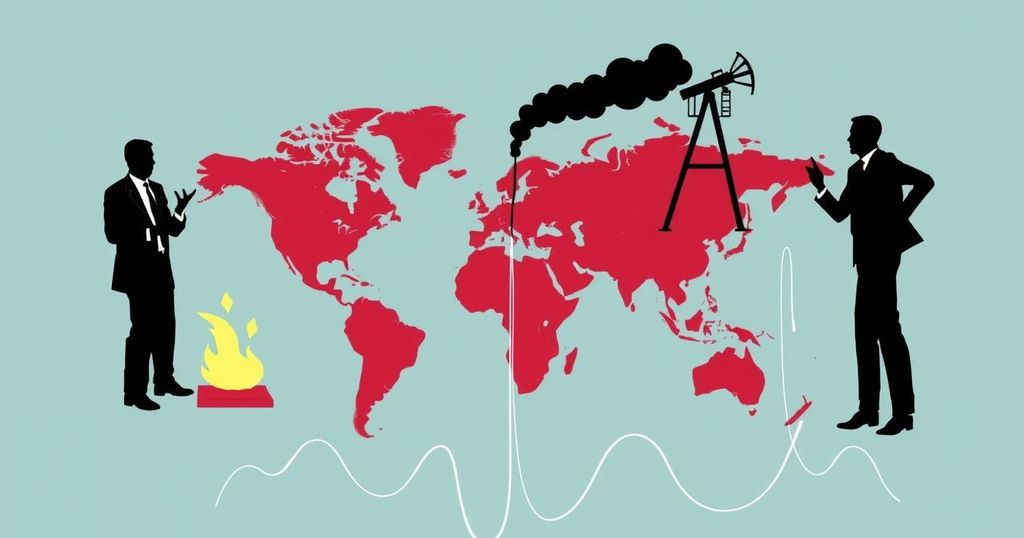The ongoing COP29 climate meetings highlight significant challenges faced by the international community in addressing climate change, exacerbated by the considerable influence of fossil fuel lobbyists. As attendance dwindles among prominent leaders and public skepticism grows, calls for reform are intensifying, with advocates pushing to limit fossil fuel interests at COP gatherings. The upcoming COP30 in Brazil may provide a vital opportunity to shift the dynamics of climate discussions and strengthen commitments to sustainable practices.
As COP29 commenced in Baku, Azerbaijan, the list of prominent attendees notably diminished, with leaders from major nations such as France, Germany, Canada, China, India, Brazil, Russia, and the United States opting out. Reasons for their absence varied from personal issues to objections against the host nation’s human rights practices. This withdrawal is particularly concerning amid a record-breaking global temperature rise, leading many to question the efficacy of the COP meetings.
Historically, COP meetings have served as pivotal platforms for international climate action, notably resulting in the Kyoto Protocol in 1997 and the Paris Agreement in 2015. However, as global temperatures continue to surpass critical thresholds, there is growing skepticism regarding the COP process, largely due to the increasing influence of fossil fuel interests. Al Gore stated that the fossil fuel sector has gained disproportionate control over COP proceedings. This situation has prompted calls for reform, urging the exclusion of fossil fuel lobbyists from future discussions.
The fossil fuel industry has asserted its presence at COP since its inception, consistently portraying itself as integral to the transition to a sustainable future. However, as the number of fossil fuel lobbyists attending the conferences has surged—reaching over 2,400 at COP28—so has evidence of corporate influence on climate negotiations.
High-profile figures in climate activism and governance are calling for changes to the COP structure, suggesting that only countries committed to the Paris Agreement should host future COPs and that corporations conflicting with climate goals should be barred from attendance. This push for reform reflects an ongoing struggle against the tendencies of fossil fuel companies to undermine serious climate action, as emphasized by climate activist Harjeet Singh.
Debates regarding the presence of fossil fuel lobbyists highlight the difficulty of reconciling the interests of member nations, especially those reliant on fossil fuel economies, with urgent climate actions needed to combat global warming. Proponents of excluding these interests believe it is essential for the integrity of the climate talks. Meanwhile, others argue for the importance of inclusive dialogue, even with dissenting parties present.
Looking ahead, the upcoming COP30 in Brazil is set to shift the dynamics significantly, with a nation vested in environmental preservation as host. The actions taken in this forum will be crucial, as Brazil has committed to addressing both deforestation and fossil fuel reliance, underscoring a more convergence-friendly path forward in global climate dialogue.
The article explores the ongoing debate surrounding the presence of fossil fuel lobbyists at the annual Conference of the Parties (COP) climate meetings. These gatherings, originally established to forge collective action against climate change, have increasingly come under scrutiny due to the overwhelming influence of the fossil fuel industry. With notable absences from key global leaders at the COP29 meeting, alongside a record rise in global temperatures, the efficacy and integrity of the COP process are called into question. The history of COP meetings reveals their importance in setting international climate policy, yet the growing participation of fossil fuel lobbyists has fostered significant concern over their ability to obstruct meaningful progress toward climate goals.
In conclusion, the forthcoming COP30 in Brazil represents a pivotal moment for international climate negotiations. With increasing calls to limit fossil fuel industry influence, activists and former leaders advocate for substantial reforms that could realign the focus towards genuine climate action. As Brazil prepares to host this significant conference, there is hope that it will mark a shift toward more inclusive and structured climate dialogues free from detrimental corporate influences. Ultimately, the effectiveness of future COP meetings will depend on their ability to regain legitimacy and foster substantive global cooperation against climate change.
Original Source: www.corporateknights.com






